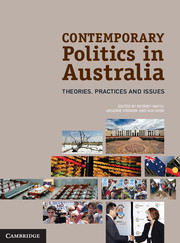Book contents
- Frontmatter
- Contents
- Tables and figures
- Contributors
- Acknowledgements
- Introduction
- I Contemporary Theories of Australian Politics
- Part II Politics in Everyday Australian Life
- Part III Elections
- Part IV Participation and Representation
- Part V Inside the Australian State
- Part VI Contemporary Public Controversies
- Introduction to Part VI
- 25 A Bill of Rights
- 26 Spending and taxing
- 27 Employment and education
- 28 Cities
- 29 Indigenous Australians
- 30 Health
- 31 The environment
- 32 Australia in the world
- Glossary
- References
- Index
- References
30 - Health
from Part VI - Contemporary Public Controversies
Published online by Cambridge University Press: 05 June 2012
- Frontmatter
- Contents
- Tables and figures
- Contributors
- Acknowledgements
- Introduction
- I Contemporary Theories of Australian Politics
- Part II Politics in Everyday Australian Life
- Part III Elections
- Part IV Participation and Representation
- Part V Inside the Australian State
- Part VI Contemporary Public Controversies
- Introduction to Part VI
- 25 A Bill of Rights
- 26 Spending and taxing
- 27 Employment and education
- 28 Cities
- 29 Indigenous Australians
- 30 Health
- 31 The environment
- 32 Australia in the world
- Glossary
- References
- Index
- References
Summary
This chapter again emphasises the fruitfulness of an institutional approach to understanding public policy controversies (see Chapter 2). Among other institutional factors discussed here, federal arrangements are critical, as are the long-standing connections between public, private and community health service funders and providers. The relatively settled policy commitment to universal public health insurance (Medicare), as well as the continuing contest between the major parties over health policy emphases, might be seen to point to the ways in which policy can be constrained and enabled by mass political behaviour (see Chapter 3), or to the state’s role as a collective capitalist committed to ensuring a healthy labour force (Chapter 4). A discourse theory approach, taking Foucault’s lead (see Chapter 5), might well interpret the chapter as revealing the normalising techniques of a range of institutions in the governance of large populations.
The provision and fi nancing of health care constitute a fi eld that holds a unique position in Australian politics and social policy. It has been a sticking point in a constitutional amendment, a trigger for a double dissolution, a mechanism for delivering the social wage and it is currently one of the only non-means-tested social services available to all Australian citizens. It is intensely and constantly contested by all levels of government and by multiple stakeholders.
- Type
- Chapter
- Information
- Contemporary Politics in AustraliaTheories, Practices and Issues, pp. 344 - 354Publisher: Cambridge University PressPrint publication year: 2012

